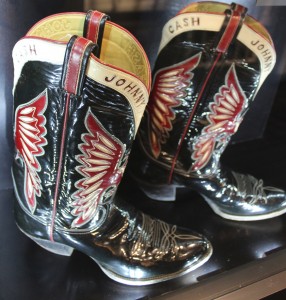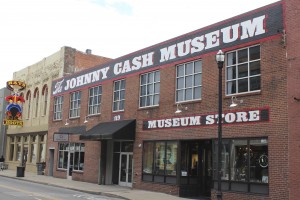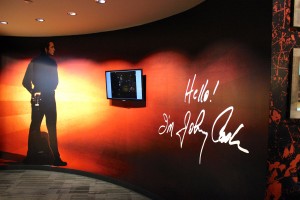Providentially, my last trip to Nashville dovetailed with the grand opening of the Johnny Cash Museum — right down the street from the Ryman Auditorium and all the honky-tonks. I’ve been a life-long fan. Quite literally, I distinctly recall the Johnny Cash in the Holy Land album cover and his rich and deep voice booming out of the speakers of my parents’ record player. I was 5 years old.
It has been a decade since the death of Johnny Cash. For fans, it has been even longer since the closing of the House of Cash headquarters in nearby Hendersonville due to flood damage. The new Cash museum in Nashville is a fascinating and interactive musical and spiritual pilgrimage for the fans who loved The Man in Black.
Cash died at age 71 of complications from his long-standing bout with diabetes in September 2003, nearly four months after the passing of his beloved wife June Carter.
 If American music had a Mount Rushmore, Cash’s distinctive profile would be prominently chiseled into the rock. He is most widely known for hits such as “Folsom Prison Blues,” “Ring of Fire,” and “I Walk the Line,” selling more than 50 million records throughout his career. He is the only person to be inducted into the Rock and Roll Hall of Fame, Country Music Hall of Fame, and the Songwriters Hall of Fame. His audiences have included presidents, prisoners, and everyone in between.
If American music had a Mount Rushmore, Cash’s distinctive profile would be prominently chiseled into the rock. He is most widely known for hits such as “Folsom Prison Blues,” “Ring of Fire,” and “I Walk the Line,” selling more than 50 million records throughout his career. He is the only person to be inducted into the Rock and Roll Hall of Fame, Country Music Hall of Fame, and the Songwriters Hall of Fame. His audiences have included presidents, prisoners, and everyone in between.
Throughout his illustrative life, Cash wrote books, hosted a popular television show, starred in and produced movies, and recorded 1,500 songs that can be found on 500 albums. His appeal is recognized by everyone from gangsta rappers to roughneck steel workers because of his charismatic magnetism that spanned five decades of popular culture. “Locust and honey … not since John the Baptist has there been a voice like that crying in the wilderness,” is how U2’s Bono described him. “The most male voice in Christendom. Every man knows he is a sissy compared to Johnny Cash.”
His song writing orbited around the universal human condition of sin and redemption, murder and grace, darkness and light. His last three-album collection was titled Love God Murder. What you saw is what you got with Cash. There was never a manufactured feeling to his art. When he sang, you could almost taste the hillbilly moonshine, smell the gunpowder of a smoking revolver, and feel the drops of blood off the thorny crown of a crucified Christ.
In 1968, he recorded his now famous album Johnny Cash At Folsom Prison and produced Live At San Quentin the following year. The prison albums were some of his most expressive and impressive work. “I was in the prison band in San Quentin when I first saw Johnny Cash,” remembered country singer Merle Haggard. “I was impressed with his ability to take 5,000 convicts and steal the show away from a bunch of strippers. That’s pretty hard to do.”
 Of course, Cash spent his fair share of time behind bars for incidents surrounding his alcohol and drug use — mostly overnights in holding cells. He turned to drugs as his career began to take off in 1958. At first, he looked upon them as a divine favor from above. He once told Larry King, “I honestly thought it was a blessing — a gift from God.” But it did not take him long to realize that he was deceiving himself and that the drugs were trinkets of the Devil, luring him deeper into retreat mode from unresolved issues in his life. “Drugs were an escape for me, a crutch — a substitute for what I now feel. I was looking for a spiritual high to put myself above my problems,” he recalled, “and I guess I was running from a lot of things. I was running from family, I was running from God, and from everything I knew I should be doing but wasn’t.”
Of course, Cash spent his fair share of time behind bars for incidents surrounding his alcohol and drug use — mostly overnights in holding cells. He turned to drugs as his career began to take off in 1958. At first, he looked upon them as a divine favor from above. He once told Larry King, “I honestly thought it was a blessing — a gift from God.” But it did not take him long to realize that he was deceiving himself and that the drugs were trinkets of the Devil, luring him deeper into retreat mode from unresolved issues in his life. “Drugs were an escape for me, a crutch — a substitute for what I now feel. I was looking for a spiritual high to put myself above my problems,” he recalled, “and I guess I was running from a lot of things. I was running from family, I was running from God, and from everything I knew I should be doing but wasn’t.”
Throughout this entire time, he never stopped singing gospel songs. He was stoned on amphetamines while he sang “Were You There When They Crucified My Lord,” one of his most beloved songs. “I used to sing all those gospel songs, but I really never felt them,” he recalled. “And maybe I was a little bit ashamed of myself at the time because of the hypocrisy of it all: there I was, singing the praises of the Lord and singing about the beauty and the peace you can find in him — and I was stoned.” He was in a drug-addled hell but these old gospel songs were etched deeply in his DNA. “They were the first songs I ever heard — and I know this sounds corny, but they’re the songs my mother sang to me.”Cash’s freedom from long-term drug addiction came through the power of prayer and the stern hand of his wife, who walked by his side through the dark night of the soul. Looking back on the difficult years, Cash said that the drugs “devastated me physically and emotionally — and spiritually. That last one hurt so much: to put myself in such a low state that I couldn’t communicate with God. There’s no lonelier place to be. I was separated from God, and I wasn’t even trying to call on him. I knew that there was no line of communication. But he came back. And I came back.”
Back in the 1970s when he became more serious about his faith, Cash said it was Billy Graham who advised him to “keep singing ‘Folsom Prison Blues’ and ‘A Boy Named Sue,’ and all those other outlaw songs if that’s what people wanted to hear — and then, when it came time to do a gospel song, give it everything I had. Put my heart and soul into all my music, in fact; never compromise; take no prisoners.” Cash subsequently sang in the sold-out honky-tonks of the world and the jam-packed arenas of the Billy Graham crusades — never allowing himself to be too easily pigeonholed by the holy or the heathens.
Johnny Cash was an irreplaceable American original who will be remembered as a cross between Jesse James and Moses — an enigmatic man in black, with a heart of gold, and a voice that could raise the dead.
